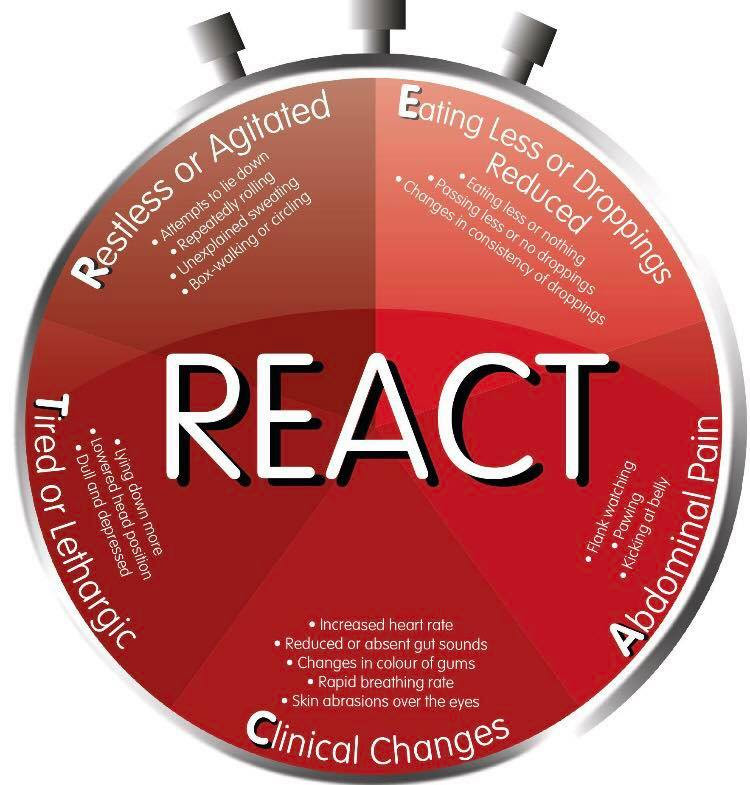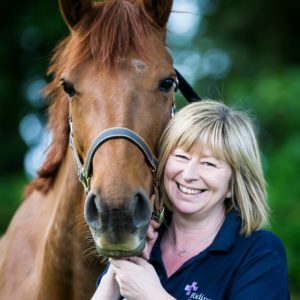Did you know that there are certain factors which may increase the risk of colic in your horse, pony or donkey? In around 70% of colic cases, the diagnosis is either a spasmodic/gas colic, or no cause is identified. There are many risk factors which we know to be significant - check out the list below so that you are aware if your horse is at an increased risk, and see if there is anything you can do to reduce your horse’s risk of colic
Follow the link for a video of a horse showing colic signs:
Does anyone know what's wrong with this horse? X
Posted by Ridings Equine Vets on Thursday, 22 June 2017
Age - there are certain colic conditions which are more likely in different age groups
Foals less than 6 months of age - increased risk of surgical lesions of the small colon, intussusceptions and ascarid impactions
Young horses (especially 3-5 year olds) - increased risk of equine grass sickness
Older horses and ponies - increased risk of colic associated with pedunculated lipomas
Breed
Thoroughbreds andArabs may be at increased risk of colic, although there is debate as to how true this is - this may more likely be due to how the horse is managed, rather than a true breed disposition
Warmbloods - small colon displacements
Ponies, Arabs and American miniature horses - small colon impactions
Arabs and Morgan Horses - enterolithiasis (a mineral concretion/calculus formed anywhere in the gastrointestinal system)
Sex
Mares: uterine torsion (twist of the uterus) may result in colic signs. Also foaling, and the 60-150 days post foaling, can be associated with an increased risk of colic, the latter being due to increased space within the abdomen which may allow displacement of the intestines from their normal position
Stallions - at risk of inguinal herniation
Stereotypic behaviour e.g. winsucking/cribbing increases a horse’s risk of simple colonic obstruction and distension, and potentially epiploic foramen entrapment - feeding these horses succulents (fruit/vegetables) can potentially reduce their risk of colic. Weaving (locomotor stereotypy)can also increase colic risk.
History of colic (medical or surgical) increases an individual’s risk of suffering further colic episodes
Season - Spring and Autumn are the greatest risk periods for colic
Geographical location
Some areas of the UK have an increased incidence of equine grass sickness.
Areas with sandy soil are also at risk of sand colic, i.e. sand accumulation in the large intestine which may cause diarrhoea, obstruction or even torsion
Changes in feeding
Ensure that the roughage you feed is of good quality and free of moulds (this is particularly important to check if you are feeding large round bales of hay/haylage as these are more likely to have mould present)
Avoid feeding large quantities of concentrate feed - this will increase your horse’s risk of colic and/or equine gastric ulcer syndrome
Recent changes in hay/haylage type or source can increase colic risk, or changing a horse’s roughage more than once per year
Remember - make all changes of feed type or amount gradually
Stabling - stabled horses are at higher risk of colic than those turned out, however it may be easier to detect early signs of colic if your horse is stabled. Increasing time at pasture has been shown to decrease the risk of colic - there is a beneficial effect of grazing, ability to exercise and interaction with the natural environment - trickle feeding and a forage based diet are ideal - attention must be paid to stocking density, exposure to endoparasites and suitable grass/plant types on pasture
Activity levels - any horse in ridden work is theoretically at an increased risk of colic relative to horses turned out with no ridden exercise, especially if there has been a recent change in exercise intensity
Dental treatment - frequent dental care is associated with a decreased risk of colic and we recommend dental checks at least every 6-12 months
Worming
Tapeworm (Anoplocephala perfoliata) is strongly associated with an increased risk of ileal impaction and spasmodic colic. We recommend testing for tapeworm with either a saliva test or blood test at least once every 12 months (or in some cases every 6 months if the individual is at high risk of picking up worms). We should alway try to test before we dose to avoid resistance to wormers, however if this is not possible worming at least yearly with a wormer which includes tapeworm cover is recommended.
Larval cyasthostomes (redworm) can be associated with caecocaecal and caecocolic intussusceptions
Ascarids may be associated with intestinal obstruction, gastrointestinal rupture, peritonitis, intussusception or abscessation in foals
Bots may be seen in the stomach of horses which have not been wormed effectively and can be associated with gastric ulceration
Colic can occur if there is sudden and rapid death of worms following administration of a wormer, so it is vital to prevent large worm burdens becoming established
We recommend that your horses have worm counts performed every 2 months between Spring and Autumn i.e. March to September to determine whether, and are strategical tested or dosed for tapeworm once-twice yearly depending on risk, they should also receive a dose for encysted redworm over the winter, ideally November/December
Other strategies to combine with your strategic worming programme to reduce the risk of colic associated high worm burdens include: rotation/resting of paddocks, co-grazing with ruminants (cattle or sheep, regular removal of faeces from pasture
Water deprivation - your horse should always have access to clean, fresh water, regardless of the time of year - this will reduce colic risk, particularly large colon impactions
Owner factors - horses cared for by their owners, rather than non-owners may be at decreased risk of colic or recurrence of colic. The reasons for this are likely to be complex, but it is food for thought for all of you out there with horses on livery…
If having read this blog you believe your horse or pony to be at an increased risk of colic, please be vigilant and monitor carefully for early signs of colic, and contact us if you are concerned on 07747771182.
Jess x

